Menu

More books on:
• environmental health
• food sovereignty
• peace and war
• globalization
• struggling against the odds
• seeking solutions
• others
Selected titles:
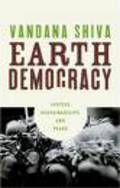
- "Earth Democracy," by Vandana Shiva
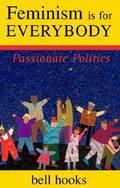
- "Feminism is for Everybody," by Bell Hooks
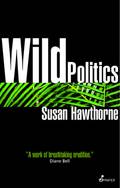
- "Wild Politics," by Susan Hawthorne
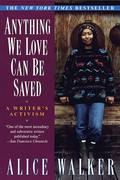
- "Anything We Love Can Be Saved," by Alice Walker
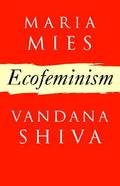
- "Ecofeminism," by Maria Mies & Vandana Shiva
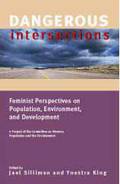
- "Dangerous Intersections," by Jael Silliman & Ynestra King
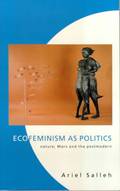
- "Ecofeminism As Politics," by Ariel Salleh
Ecological feminism
Living on the Earth: women's voices, activism and ecofeminism
Earth Democracy: Justice, Sustainability, and Peace
Vandana Shiva
South End Press, July 2005, Pages: 200
ISBN: 089608745X
Reviewed by Anna Gyorgy, WLOE coordinator, for the unfortunately now defunct Peacework Magazine:
"Her melodic name is known to millions who follow or are part of many of the struggles around the world for food quality and sovereignty, water for all, for peace and against the violence of corporate globalization and religious fundamentalism. Vandana Shiva: dynamic Indian writer, alternative Nobel prize winner, 'physicist and philosopher,' activist.
Her earlier works discussed the effects of privatization and corporate control on agriculture, water and genetic diversity. Their titles reflect her stand: Stolen Harvest: The Hijacking of the Global Food Supply, Water Wars: Privatization, Pollution, and Profit, Biopiracy: The Plunder of Nature and Knowledge and Monocultures of the Mind: Perspectives on Biodiversity and Biotechnology.
Now in "Earth Democracy" she has brought together the themes of her life's work, with a holistic view of the current situation and what people can do about it. "Earth democracy shifts the worldview from one dominated by markets and military, monocultures and mechanistic reductionism, to the peaceful co-creation and co-evolution of diverse beings, connected through the common bonds of life… (It) allows us to remove our blinders, imagine and create other possibilities… Liberation in our genocidal times is, first and foremost, the freedom to stay alive." (185)
"Earth Democracy" presents basic problems threatening planetary health and even survival, but in a format oriented towards the positive. The major sections address aspects of this Earth Democracy: Living Economies; Living Democracies; Living Cultures; and Earth Democracy in Action. Each section discusses ecological and social challenges, with historical background and current examples. But first, she presents the 10 Principles of Earth Democracy, listed here in short form (see pages 9-11):
1. All species, peoples, and cultures have intrinsic worth.
2. The earth community is a democracy of all life.
3. Diversity in nature and culture must be defended.
4. All beings have a natural right to sustenance.
5. Earth Democracy is based on living economies and economic democracy.
6. Living economies are built on local economies.
7. Earth Democracy is a living democracy.
8. Earth Democracy is based on living cultures.
9. Living cultures are life nourishing.
10. Earth Democracy globalizes peace, care, and compassion.
Sentence after sentence in the text rings out, as if Vandana Shiva were bringing an audience to its feet, as she so often does. As I read it, marking one stirring phrase after another, I feared only that a so-called 'average reader' might have trouble with some terms that could, if unfamiliar, be a bit much to digest, such as: "New intellectual property rights enclose the biological, intellectual, and digital commons."
But as I continued, I found that these broad statements were followed by close-to-home illustrations. For instance, new laws on patenting in many countries prevent farmers from raising, selling, and exchanging seed freely, the basis of indigenous and ecologically successful agriculture for millennia.
Examples of such 'legal' thefts of seed range from Scotland to Iraq, where a 2004 order "imposes plant and seed patents on Iraqi farmers," an estimated 97 percent of whom used farm-saved seed, which would now be illegal. (p. 150). In India, 80 percent of all seed is saved by farmers.
There is organized opposition to these patent injustices. Shiva notes, "Farmers throughout (India) served notices at district offices… and more than 5 million peasants have taken a pledge to continue to save and exchange seed, and to disobey any law that prevents them from doing so."
And in fact the most inspiring aspect of "Earth Democracy" is this contrapuntal presentation of oppression and resistance, with India as the predominant scene of action. This center forces those of us from so-called more 'developed' lands to appreciate the importance of local food production and "sustenance" economies intimately bound with age-old cultures.
US and European subsidies, economic 'dumping,' and world economic institutions wage a deadly war on these cultures and economies as well as future generations through support for chemical farming, mono-cropping of genetically-modified corn, soy and cotton, and destructively inappropriate regulations.
The resisters range from brave individuals ñ like Mylamma, "the woman who started the movement against Coca-Cola in Plachimada," where the water-hungry bottling plant made local wells go dry, then fill up with polluted wastewater ñ to literally millions in the combined opposition to privatization of water in the capital, Delhi, and a related dam planned for the sacred Ganges river.
"Building water democracy means building alliances," writes Dr. Shiva, but she also makes it happen, as in the next sentence: "I started to contact citizens groups in Delhi and people's movements along the Ganges."
Vandana Shiva's message is one of hope and empowerment, through diversity and local resistance and alternatives for survival.
Her closing words in "Earth Democracy": "Imperialism has always had global reach. Today's movements have a planetary reach and a planetary embrace. We have just begun to tap our potential for transformation and liberation. This is not the end of history, but another beginning."
Thanks to her, and others like her, some paths are clearer."
See also other titles by Vandana Shiva: "Ecofeminism" (together with Maria Mies), "Biopiracy" and "Water Wars."
Feminism is for Everybody
Passionate Politics
Bell Hooks
South End Press, October 2000, Pages: 123
ISBN: 0896086283
Taking a decidedly radical feminist position, bell hooks, the writing voice of Gloria Watkins, promotes the learning of feminist theory and history as essential parts of the process of self-actualization and the practice of freedom. In Feminism is for Everybody: Passionate Politics, hooks provides an overview targeted to readers new to interdisciplinary feminism. Importantly, hooks argues in strong opposition to the anti-feminist public voice in contemporary culture. In particular, she speaks to young female readers who know little about feminism, many of whom falsely assume that sexism is no longer a problem or is "no longer relevant since women now have equality" (49). hooks also speaks to male readers, assuring them that we too can play a positive role in the feminist movement. The bottom line is that "feminism is a movement to end sexist oppression" (6). hooks argues that if people adopt her definition, and know more about feminism and feminist history, then they would no longer fear it.
Feminism is for Everybody provides an introduction to the work of bell hooks, a prolific writer about popular feminist theory and cultural criticism. hooks considers herself a social activist and a revolutionary feminist, though her work has had a significant impact in the academic world. This book’s initial interest stems from hooks’ argument that sexism, racism, classism, capitalism, and colonialism in America promote oppression by idealizing oppressive values and characteristics. In order to liberate, hooks interrogates cultural assumptions supported by oppression. She prompts readers to share in the intellectual and spiritual growth of women, to raise awareness about the world in which they live; she respects and encourages readers to find their own voices, and helps them critically reflect on and analyze their place in society.
Wild Politics
Susan Hawthorne
Spinifex Press, Australia 2003
ISBN 1-876756241 pb
One of the many gifts of Susan Hawthorne's Wild Politics is the unrelenting analysis and illustration of ways neocolonialism is promoted under the banner of Western liberalism and economic globalisation. Bringing together research and auguments from hundreds of sources and taking up the work of feminists, ecologists, and indigenous peoples, she challenges globalization and argues for biodiverse sustainability. – Sarah Lucia Hoagland, The Women's Review of Books.
"This is the book I wish I had written myself." - Our Paper
"Susan Hawthorne’s book is a major contribution, on several levels, to the definition of what we are fighting for" – The Paper
"Wild Politics is a great metaphor, signalling the need for change from western culture's false colonist universalism to life-oriented systems of connection, richness, texture, depth and meaning. Susan Hawthorne has written an inspiring book, drawing on feminist and indigenous knowledge to critique global capitalist practice and create a vision of a regenerative world sustaining the environment and all its people"– Prue Hyman
Anything We Love Can Be Saved
Alice Walker
Ballantine Books, New York 1997
225p. $12.95
ISBN 0-345-40796-2 Pb
"A healthy body, a well-trained mind, a sense of solidarity with one's people, these are harder to lose than a million dollars, and offer more security. This empowerment of the poor - literacy, good health, adequate housing, freedom from ignorance - is the work of everyone of conscience in the coming century... For, if the poor are not empowered - by any means at their disposal - they will continue to be devoured by the rich. Just as women, if not empowered, will continue to be the slaves of men."
In this collection of essays Alice Walker shares lessons from a life of activism and caring. She writes of peace and struggle for freedom, lessons learned from elders and from nature, with a special focus on women.
From the poem "A Woman is not a Potted Plant" (p. 105)
"... a woman
is wilderness
unbounded
holding the future
between each breath
walking the earth
only because
she is free
and not creepervine
or tree."
Ecofeminism
Ecofeminism: the book by Maria Mies and Vandana Shiva defined and explained ecological feminism.
First published in 1993, it was reissued by Zed Press (UK) in 2014, with a new foreword by Ariel Salleh.
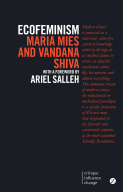
Maria Mies & Vandana Shiva
Zed Books, London 1993
328p. ISBN 1 85649 156 0 Pb
'A scholarly but passionate study... Ecofeminism's analysis of global politics, ecology and the status of women has an unmistakable ring of truth.' - Women's Review of Books
This is the basic text for women's study of ecofeminism, by two leading activist-scholars, one from the 'north', German professor emeritus Maria Mies, the other from the 'south', Indian physicist Vandana Shiva. Together they present a fundamental feminist critique of modern industrial development, its effects on women and children, on nature and all aspects of the environment, with many examples from real life around the world.
"'Development' has meant the ecological and cultural rupture of bonds with nature, and within society, it has meant the transformation of organic communities into groups of uprooted and alienated individuals searching for abstract identities. What today are called ecology movements in the South are actually movements for rootedness, movements to resist uprooting before it begins." - Vandana Shiva
The authors explore the crisis in science ("a Western, male-oriented and patriarchal projection which necessarily entailed the subjugation of both nature and women"); the inequality in current development; environmental degradation and its effects; biotechnology and reproductive technologies; globalization and its effects on women's lives; and finally other models for a new vision of development, based on the Subsistence Perspective.
"A subsistence perspective demands a new paradigm of science, technology and knowledge. Instead of the prevailing instrumentalist, reductionist science and technology - based on dualistic dichotomies which have constituted and maintain man's domination over nature, women and other people - ecologically sound, feminist, subsistence science and technology will be developed in participatory action with people..." - Maria Mies
Dangerous Intersections
Feminist Perspectives on Population, Environment and Development
Jael Silliman and Ynestra King, editors
South End Press, Boston 1999
$20.00 ISBN 0-89608-597-x Pb
"The Committee on Women, Population, and the Environment (CWPE) investigates the reasons why a variety of environmental, social, and security issues are defined or presented as population problems… CWPE rejects the simplistic projection of population growth as the major source of environmental degradation. We do so in order to redirect attention to find socially just solutions."
CWPE, "a loose but politically astute network of feminist scholars and activists" came together in 1991 in response to momentum prior to the United Nations Conference on Environment and Development in Rio in 1992 linking environmental destruction to population growth. CWPE "defined the root causes (of environmental destruction) to be social and economic structures, rather than population demographics and women's fertility."
Among many thought-provoking essays, feminist geographer Joni Seager explaines how the military are major environmental pollutors, and analyzes related devastation as a product of the militarized "cult of masculinity." Gender and development specialist Meredeth Turshen describes the economic and political reasons leading to environmental desvastation in Tanzania. Women's Studies and History professor Marsha J. Tyson Darling details historic and present ways that African American women and their sexuality have been defined and objectified: "With each passing decade, the misogynist messages in much of social science scholarship, the media, and popular culture spread ever more extensively through American culture."
"This significant anthology… highlights the intersections of sexism, racism, and classism that blame women of color and third world women for the 'population problem' linked with today's environmental crisis… Stilliman and King call for a more humane future premised on women's basic human rights and social and environmental justice." - M. Annette Jaimes-Guerrero, editor, The State of Native America
Ecofeminism As Politics: nature, Marx and the postmodern
Ariel Salleh
Zed Books March, 1998
Paperback
ISBN: 1856494004
"In the search for sustainable futures, this book is written to destabilize eurocentric political discourses that construct humanity as separate from nature. That in turn, means interrogating conventional Marxist class analysis, focusing instead on a grouping that Ariel Salleh names "meta-industrial workers." These are housewives, peasants, indigenous peoples -- whose reproductive labors minimize risk and hold complex living systems together. Here ecofeminism is a politics embedded in specific skills and values-an "embodied materialism." At the psychological level, it is a politics energized by the painful contradictory identity of being both a human subject and a natural resource. This materialist epistemology silences old criticisms of ecofeminism as essentialist. Ecofeminism as a meta-industrial perspective, integrates our thinking about ecological, social justice, feminist, and indigenous concerns. This common denominator politics has been inspired by the author's experience as both activist and sociologist of knowledge. The text travels laterally through topics such as globalization and Green ideologies, gendered science and gene tech, aboriginal land rights, the population debate, critical reflections on neo-liberalism and on Marx's theory of value. Not surprisingly the book has found a home in environmental studies, history and philosophy of science, ethics, politics, sociology, cultural and women's studies. Social movement researchers will find it gives a broad brush history of a major grassroots resurgence." Source, and for more information:
http://www.lancs.ac.uk/staff/twine/ecofem/ariel.html
Ariel Salleh (Australia) was a founding member of the Greens in Sydney, Australia in 1985 and is a long time activist in biodiversity conservation and water politics. An Associate Professor of Social Ecology at the University of Western Sydney, she serves on the Australian Federal Government's Gene Technology Ethics Committee and Environment & Society Research Committee of the International Sociological Association. She is currently on a fellowship at the Women's Studies Research Center, Amherst, USA. Salleh is author of "Ecofeminism as Politics: nature, Marx and the postmodern" (London: Zed Books, & New York: St Martins, 1997) and many journal articles bringing a critical gender lens to mainstream eco-political thought. See also "ecofeminists at work" -
http://www.arielsalleh.net.
For more resources on ecofeminism: ecofeminism.net and ecofem.org

